|
|
|
Sort Order |
|
|
|
Items / Page
|
|
|
|
|
|
|
| Srl | Item |
| 1 |
ID:
172688
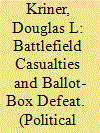

|
|
|
|
|
| Summary/Abstract |
In the 2016 election, foreign policy may have played a critically important role in swinging an important constituency to Donald Trump: voters in high-casualty communities that had abandoned Republican candidates in the mid-2000s. Trump’s iconoclastic campaign rhetoric promised a foreign policy that would simultaneously be more muscular and restrained. He promised to rebuild and refocus the military while avoiding the “stupid wars” and costly entanglements of his predecessors. At both the state and county levels, we find significant and substantively meaningful relationships between local casualty rates and support for Trump. Trump made significant electoral gains among constituencies that were exhausted and politically alienated by 18 years of fighting. Trump’s foreign policy shows a president beset by competing militaristic and isolationist impulses. Our results suggest that giving into the former may come at a significant electoral cost.
|
|
|
|
|
|
|
|
|
|
|
|
|
|
|
|
| 2 |
ID:
085272
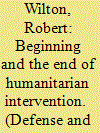

|
|
|
| 3 |
ID:
148357
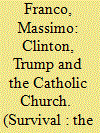

|
|
|
|
|
| Summary/Abstract |
The 2016 US presidential election was uncomfortable for the Vatican and the American bishops.
|
|
|
|
|
|
|
|
|
|
|
|
|
|
|
|
| 4 |
ID:
095128
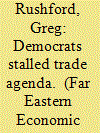

|
|
|
| 5 |
ID:
096378
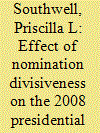

|
|
|
|
|
| Publication |
2010.
|
| Summary/Abstract |
This research examines the effect of disgruntlement among primary and caucus voters who supported U.S. presidential nomination losers-a potentially divisive nomination process. I analyze the general election voting behavior of primary and caucus voters in the 2008 presidential election to determine if differences exist between supporters of the winning nominee in each party and backers of other candidates who also sought the nomination. A multivariate analysis of the determinants of "loyal party vote" suggests that Clinton and Edwards supporters showed a significantly higher degree of defection in the general election, although this behavior did not occur among people who voted for Romney or Huckabee in their state's primary or caucus.
|
|
|
|
|
|
|
|
|
|
|
|
|
|
|
|
| 6 |
ID:
093729
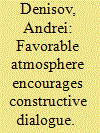

|
|
|
|
|
| Publication |
2009.
|
| Summary/Abstract |
A. I. Denisov: Mr. Obama has completed his initial period in office as president of the United States. To be more accurate, nine of 48 months of his first presidential term have passed. It is a considerable period, and as far as we know, the basic parameters of US policy, the policy of the Democratic administration, have already been finalized or are close to finalization. This also applies to its policy with regard to Russia. On the one hand, it is too soon to sum up the first results of the "resetting" of relations, because the "resetting" process continues, going through a fairly active phase. On the other hand, something definitive has already been accomplished. This refers primarily to the climate, the atmosphere of our relations. One should not underestimate this apparently immaterial factor, because only a favorable atmosphere makes it possible to conduct constructive dialogue aimed at achieving what in political science is known as a "win-win" formula - i.e., a situation that is advantageous to both sides.
|
|
|
|
|
|
|
|
|
|
|
|
|
|
|
|
| 7 |
ID:
149333
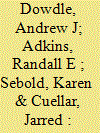

|
|
|
|
|
| Summary/Abstract |
A number of scholars successfully modeled and predicted presidential nomination outcomes from 1996–2008. However, dramatic changes occurred in subsequent years that would seem to make replicating these results challenging at best. Building on those earlier studies, we utilize a series of OLS models that included measures of preprimary resources and early campaign successes or failures to forecast that Hillary Clinton and Donald Trump would win the Democratic and Republican presidential nominations in 2016. This outcome suggests that some fundamental factors governing nomination outcomes have not changed despite the conventional wisdom.
|
|
|
|
|
|
|
|
|
|
|
|
|
|
|
|
| 8 |
ID:
092537
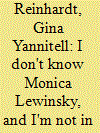

|
|
|
|
|
| Publication |
2009.
|
| Summary/Abstract |
On January 18, 1998, I walked off a plane in São Paulo, Brazil. As I cleared customs and weaved through the hot, steamy airport, the cafes and newsstands, I noticed one young woman's face on the front pages of all the newspapers and journals I passed. She was wearing a beret and hugging Bill Clinton in the photo, and her name was Monica Lewinsky. Never having heard of her before, I assumed the interest in her was specific to Brazil. Surely I would know her name if she actually mattered to anyone, I thought, and went on.
|
|
|
|
|
|
|
|
|
|
|
|
|
|
|
|
| 9 |
ID:
091992
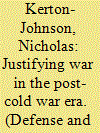

|
|
|
|
|
| Publication |
2009.
|
| Summary/Abstract |
This article examines presidential justifications for war in two key acts of US military intervention in the post-cold war period. The presidential justifications for the first Gulf War and Kosovo intervention are highlighted to reveal a changing discourse for war.
|
|
|
|
|
|
|
|
|
|
|
|
|
|
|
|
| 10 |
ID:
106347
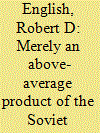

|
|
|
|
|
| Publication |
2011.
|
| Summary/Abstract |
As the Cold War recedes, it becomes increasingly difficult to imagine what might have been and to objectively assess the contribution of Gorbachev's leadership and his legacy. Quite apart from the loss of a historic opportunity to build a radically different post-Cold War international relations, it is that the West did so in large measure out of an inability to understand that this was what, at least by 1989-1990, was central to Gorbachev's diplomacy. By focusing on our victory of superior power, and ignoring the role of Gorbachev's ideas, we ensured that what followed would indeed continue to be dominated by power politics. Once again, realism helps create the world it purports only to describe. By spurning Gorbachev's potentially greatest legacy as a twentieth-century leader, we ensured that this legacy would indeed be considerably less that it might have been.
|
|
|
|
|
|
|
|
|
|
|
|
|
|
|
|
| 11 |
ID:
095589
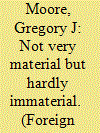

|
|
|
|
|
| Publication |
2010.
|
| Summary/Abstract |
In 1999 Sino-American relations experienced intense strain as a result of NATO's Kosovo intervention, and in particular by the bombing of the Chinese Embassy in Belgrade by an American B-2 bomber. Why did the bombing of China's embassy in Belgrade in the spring of 1999 touch such a raw nerve among the Chinese people and leadership? With the coming of the tenth anniversary of these events, what still needs to be explained is how Chinese and Americans could draw such divergent conclusions about that which they've never disagreed on-the incontestable fact of the embassy's demolition-and how the fact that what Americans called "a mistake" could almost completely derail Sino-American relations, which President Clinton in his very successful visit to China a year before had called a "strategic partnership." Based on a series of semistructured interviews the author did in Beijing and Washington with 28 Chinese and 30 American experts, this research draws a number of important conclusions in this regard. First, intensifying and even defining the conflict were a number of important perceptual gaps. Second, given the dispute over the intentionality of the embassy bombing, the conflict boiled down not to clashing interests, per se, but rather to issues of trust and beliefs about motives and intentions. Third, poor handling of the embassy bombing by both governments deepened the conflict and the alienation both sides felt. Fourth, underlying the lack of trust and the perceptual gaps between the two sides was "Fundamental Attribution Error.
|
|
|
|
|
|
|
|
|
|
|
|
|
|
|
|
| 12 |
ID:
059380
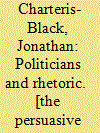

|
|
|
|
|
| Publication |
Hampshire, Palgrave Macmillan, 2005.
|
| Description |
xii, 239p.Hbk
|
| Standard Number |
1403946892
|
|
|
|
|
|
|
|
|
|
|
|
Copies: C:1/I:0,R:0,Q:0
Circulation
| Accession# | Call# | Current Location | Status | Policy | Location |
| 049238 | 825.910915/CHA 049238 | Main | On Shelf | General | |
|
|
|
|
| 13 |
ID:
098471
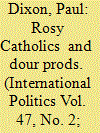

|
|
|
|
|
| Publication |
2010.
|
| Summary/Abstract |
This article challenges the orthodox, 'pan-nationalist' view of the impact of the Cold War and President Clinton's role in the Northern Ireland peace process. It is argued that this orthodox view places much faith in the 'front stage'; self-congratulatory accounts of political actors who sought to enhance their reputations through involvement in the peace process. A theatrical metaphor is deployed to 'go behind the scenes' and produce a more nuanced account of the influence of the US President. It is argued first, that the pan-nationalist charade deliberately exaggerated Clinton's role in order to demonstrate the power of 'unarmed struggle' and win over a key republican audience to the peace process. Second, the British government, to some extent, played its 'villainous' role in the pan-nationalist charade because it understood the Sinn Fein leadership's problems in bringing a united republican movement into a ceasefire. Third, the peace process was emerging well before the US President took his cue from Irish nationalist politicians to enter the political stage. Fourth, the 'pan-nationalist' view does not consider the malign impact of the US role on unionism, which underlined unionist isolation and undermined pro-Agreement unionism. Finally, it is argued that President Clinton's grasp of the 'realities' of Northern Irish politics was not firm and the President oscillated between an overoptimistic 'modernising' view of the conflict and over-pessimistic primordial - 'Rosy Catholics' and 'Dour Prods' - view neither of which accurately describes the conflict.
|
|
|
|
|
|
|
|
|
|
|
|
|
|
|
|
| 14 |
ID:
094512
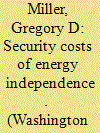

|
|
|
| 15 |
ID:
084913
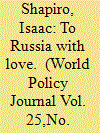

|
|
|
| 16 |
ID:
085459
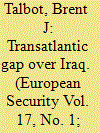

|
|
|
|
|
| Publication |
2008.
|
| Summary/Abstract |
This paper makes three major arguments: 1) US policy inconsistencies during the Iraq containment era alienated key European allies; 2) the allies really wanted the same outcome as the US in Iraq; and 3) the allies supported the US role as leader of the international system, but they envisioned a cooperative leader, not the unilateral actions of the Clinton and Bush (Jr) administrations. Thus, US policy inconsistencies are partially responsible for the lack of allied support for the 2003 invasion of Iraq. Three time periods are examined: the Gulf War (1990-91), the Clinton-led coalition that continued against Iraq under UN sanctions-prior to the invasion to oust Saddam Hussein (1991-2002), and events during the Bush administration which led to the 2003 takeover of Iraq. The paper concludes with lessons learned and implications for future of US-European relations.
|
|
|
|
|
|
|
|
|
|
|
|
|
|
|
|
| 17 |
ID:
091939
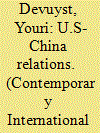

|
|
|
|
|
| Publication |
2009.
|
| Summary/Abstract |
China is playing a crucial role in the Obama administration's attempt to build a multi-partner world' based on cooperation and shared responsibilities.In light of the profound geo-economic transformations of 2008-2009, the United States has little choice but to strive for partnership, especially with the country that is Washington's major creditor.
|
|
|
|
|
|
|
|
|
|
|
|
|
|
|
|
| 18 |
ID:
058713
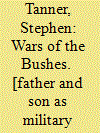

|
|
|
|
|
| Publication |
Philadelphia, Casemate, 2004.
|
| Description |
ix, 297p.hbk
|
| Standard Number |
1932033327
|
|
|
|
|
|
|
|
|
|
|
|
Copies: C:1/I:0,R:0,Q:0
Circulation
| Accession# | Call# | Current Location | Status | Policy | Location |
| 049113 | 973.928/TAN 049113 | Main | On Shelf | General | |
|
|
|
|
| 19 |
ID:
120390
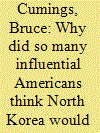

|
|
|
| 20 |
ID:
090868
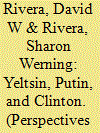

|
|
|
|
|
| Publication |
2009.
|
| Summary/Abstract |
Immediately after coming to power, the Clinton administration declared the consolidation of market and democratic institutions in Russia to be a vital American interest. The administration's central tactic for promoting this outcome was to help Boris Yeltsin remain in power. In a major assault on Clinton's historical legacy, much of the scholarly community maintains that U.S. policy was fundamentally flawed, both morally and strategically. In the view of these analysts, post-Soviet Russia's founding president was an autocratic leader who derailed the country's progress toward democracy. However, this body of research focuses exclusively on the Russian Federation and fails to utilize comparative referents. In contrast, we analyze the experiences of the full population of post-communist states of Eastern Europe and Eurasia from 1991 to the present. Whether examined in cross-national or longitudinal perspective, we find that Russian democracy under Yeltsin was, relatively speaking, a success. We conclude that the Clinton administration's policy of support for Yeltsin both served various American foreign policy interests and strengthened the prospects for democratic consolidation in Russia, thereby fulfilling the dictates of both real- and idealpolitik. In addition, the relative success of Russia's democratization in the 1990s, the reversal of that pattern in this decade, and the magnitude of the transformation of the polity under Putin all demonstrate the pivotal role played by presidential leadership in Russia's transition
|
|
|
|
|
|
|
|
|
|
|
|
|
|
|
|
|
|
|
|
|